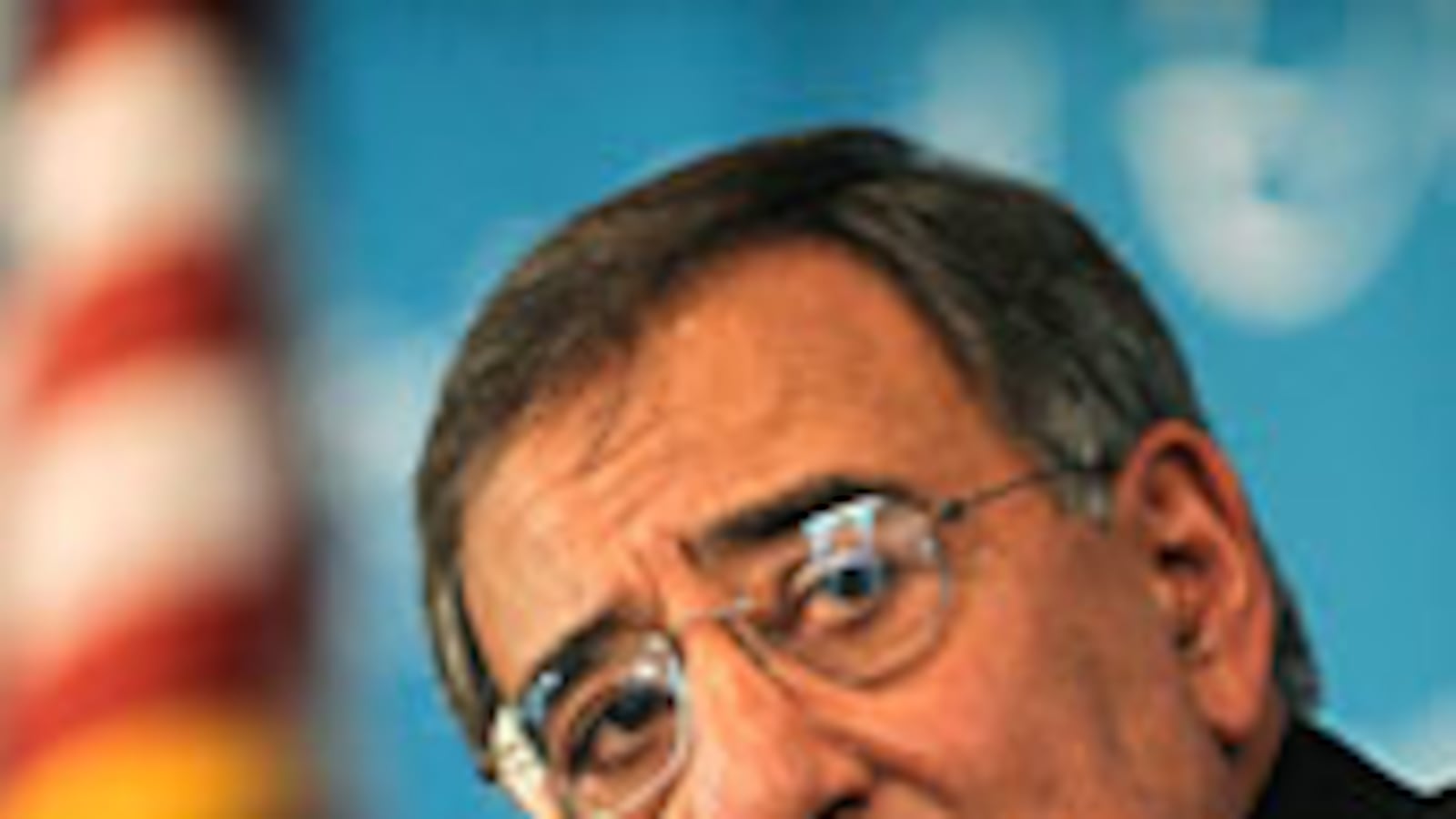
On Monday, The New Yorker hits newsstands featuring “The Secret History,” an article by Jane Mayer that takes a close look at the CIA under its new director, former congressman and White House chief of staff Leon Panetta.
Following up on the pioneering work in her prize-winning book The Dark Side, Mayer examines the legacy of the Bush years—torture practices and a series of secret detention facilities around the world. Over the objections of senior players in the agency, President Obama shut them down, but the Obama White House and Director Panetta continue a struggle on two fronts. On one hand, they face relentless attacks from former Vice President Dick Cheney, who says America’s security was compromised by the decision. On the other hand, they struggle to keep the door to the CIA’s vault of Bush-era secrets firmly shut—avoiding demands for disclosure of documents and records, calls for an independent investigation, and even the suggestion that a criminal investigation is called for.
“Any serious look back at how American came to embrace torture would inevitably lead to Cheney.”
I interviewed Mayer about the major findings in her article and a few things she learned after the piece had gone to press.
Your current piece is in some respects an effort to assess how Leon Panetta, a man with vast experience in Washington insider politics but little background in foreign-intelligence operations, is grappling with his new job as director of central intelligence. He has been squarely at the center of a string of controversies about disclosure of CIA’s black sites and torture programs. His earlier statements showed he favored transparency, and there are some suggestions that he supported proposals for a commission of inquiry into the formation and implementation of torture policy. Did he? And if he did, how does he reconcile this with his position now—strenuously insisting on keeping the lid on everything?
Panetta told me that he did in fact at first favor some sort of “truth commission” to review the CIA’s history, but he said that once it became clear that President Obama was against the idea, he and other supporters basically backed off. He told me also that he doesn’t see much chance it will be revived at this point. In part, his support was for political reasons—he saw the commission as a way to delegate these politically toxic issues to experts outside the administration.
He mentioned former Supreme Court Justice Sandra Day O’Connor and former Congressman Lee Hamilton as the types of nonpartisan experts he thought could be commissioners. It’s an irony that while Panetta is known for his political experience—on this issue President Obama decided against him—because he and his own political team thought a commission would just embroil Obama further in Bush’s mistakes. In particular, they didn’t want to arouse the ire of Bush and Cheney, Panetta told me. So they squelched the idea of looking back. Any serious look back at how American came to embrace torture would inevitably lead to Cheney. It would also likely end up having to reexamine the false confessions from coerced detainees that helped get us into the war in Iraq. They just see too much partisan political peril in it.
What was the breakdown on this issue in the Obama White House—who else spoke against the commission concept, and what were their arguments?
The opposition really came from Obama’s political advisers. David Axelrod, I know, thinks a commission would be a mistake. Basically, they regard their ability to hold the support of independent and conservative Democratic voters as essential politically for their very ambitious agenda. They dread any issue that could launch a divisive culture war. An exploration of Bush’s use of torture, seen from this perspective, is a potentially dangerous political distraction.
Your new piece in The New Yorker includes bits from an interview you conducted in 2007 with John O. Brennan—Obama’s initial pick to run CIA who now advises Obama on counterterrorism matters in the White House on the National Security Council. You quote Brennan saying, “Would the U.S. be handicapped if the CIA was not, in fact, able to carry out these types of detention and debriefing activities?” He’s referring to the extraordinary renditions program and the Bush program of enhanced interrogations. “I would say yes,” he answers his own question. Isn’t that essentially the argument that Vice President Cheney makes and that President Obama rejected?
Yes. Brennan, when I interviewed him two years ago, wasn’t just neutral, he was a supporter of using coercive interrogation techniques. He drew the line, according to his friends, at waterboarding prisoners, which they say he opposed. But otherwise he supported many of the coercive approaches that Obama has banned. Maybe Brennan changed his mind after 2007. He wouldn’t grant The New Yorker an interview to clarify this. So we’re left with his words from 2007.
Has Brennan been pushing Obama to keep the history of the Bush program under wraps? Does he have any personal exposure that figures in this decision?
According to Newsweek, Brennan opposed the recent release of several shocking Justice Department memos authorizing “enhanced interrogation techniques,” and he helped mobilize Panetta against releasing the documents to the public, too. Much of the fight over these documents centered on damaging details such as the fact that the CIA waterboarded one prisoner 183 times. Obama overrode the concerns of advisers and released the documents anyway, partly on the grounds that the torture program was no longer operational, since he had banned it, so none of the secrets involved protecting ongoing programs.
As for Brennan’s exposure—these are the sorts of questions that remain unanswered so long as there is not more information. But he was a very senior CIA official at the time that the authorized abuse was at its worst, and he was so close to then Director George Tenet, who greenlighted the program, a source in this story described them as “joined at the hip.” According to Brennan’s own account, he was in meetings where the interrogation and detention program was discussed. So any serious inquiry would inevitably include a review of his role.
Vice President Cheney has insisted that the White House’s role was essentially giving the go ahead to intelligence operatives who sought to use rougher techniques. The mounting evidentiary case points just in the opposite direction—to figures in the White House pushing for use of harsh techniques. Did you get any insight into this question in your last set of interviews?
Panetta says he has no doubt that the White House led the way, pushing the CIA into hurting prisoners. But John Helgerson, the former Inspector General of the CIA until last month, told me that he thinks the White House, Pentagon, and CIA were all equally responsible. As he put it, “They went into it arm and arm.”
You broke most of the story of the role of psychologists James Mitchell and Bruce Jessen in the development and initial implementation of the Bush interrogation program. The CIA seems to have gone to unusual lengths to shield them and their ties to other prominent psychologists, like former American Psychological Association president Joseph Matarazzo. Are they still working on interrogation issues at taxpayers' expense?
To my amazement, I was told that the CIA renewed its rich contract with James Mitchell and Bruce Jessen in February 2009—in other words, after Obama took office. What is so astounding about this is that these two former military psychologists have been described to me and others as the original designers of the torture techniques. They were there at the creation when waterboarding was used 183 times on Abu Zubaydah. Waterboarding, according to Attorney General Eric Holder, is torture. Torture is a felony, sometimes treated as a capital crime. Yet despite all of this, the CIA renewed their contract this year. The only thing that finally cut their revenue stream off was the passage of a new law curbing the CIA from using contractors in interrogations. This past spring, after that law passed, Leon Panetta fired their firm. But it seems that for seven years they have been on the public dole. If the CIA had any qualms about using the cruel techniques these two contractors designed, it certainly wasn’t reflected by February 2009.
Scott Horton is a law professor and writer on legal and national security affairs for Harper's Magazine and The American Lawyer, among other publications.






